高考英语语法复习 代词 课件共(47张)
文档属性
| 名称 | 高考英语语法复习 代词 课件共(47张) | 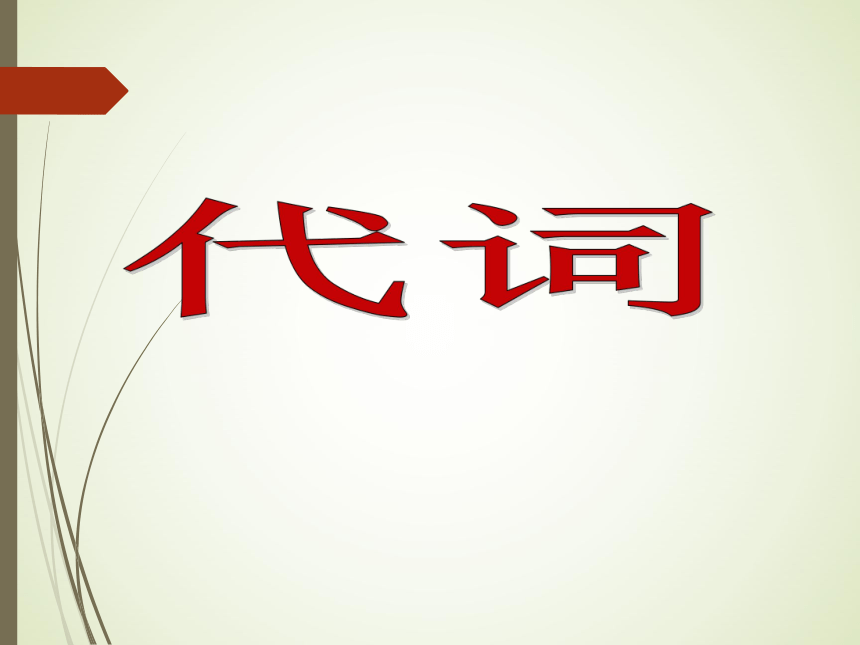 | |
| 格式 | zip | ||
| 文件大小 | 234.5KB | ||
| 资源类型 | 教案 | ||
| 版本资源 | 通用版 | ||
| 科目 | 英语 | ||
| 更新时间 | 2019-04-30 20:56:24 | ||
图片预览

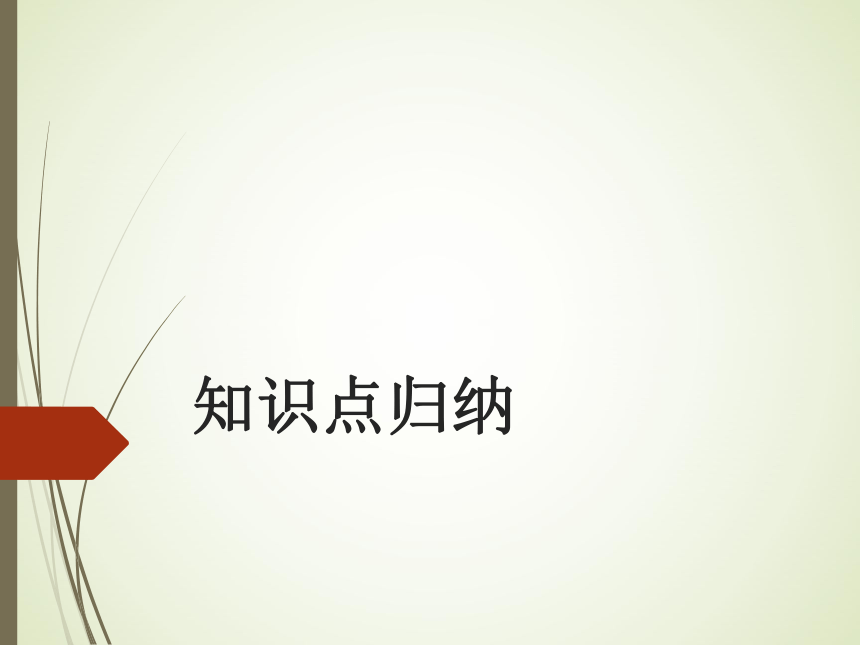
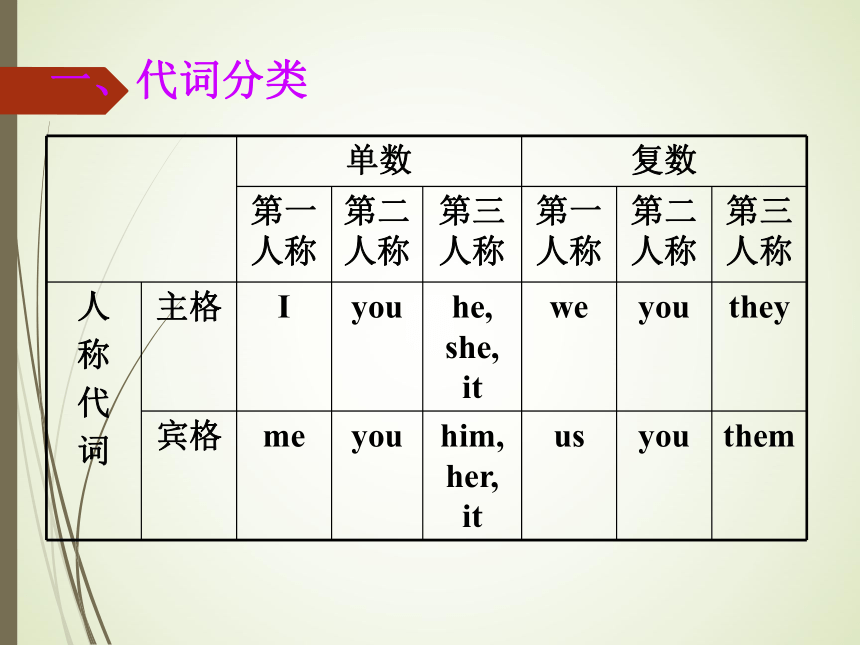
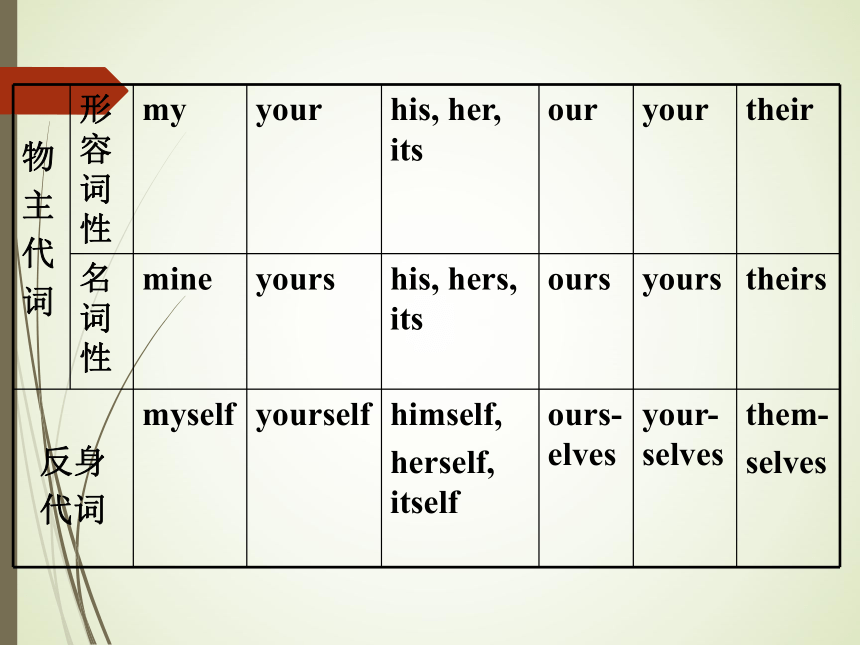
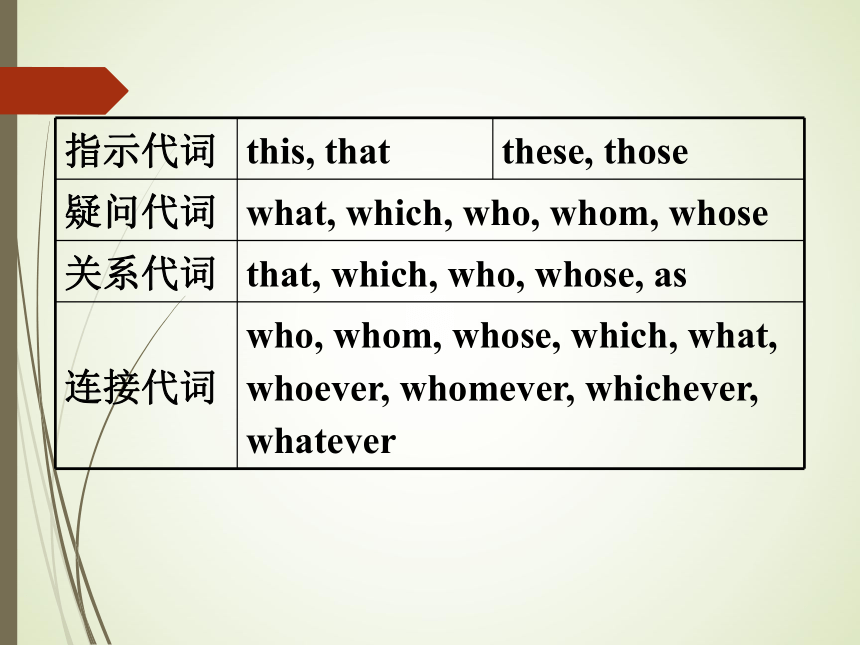

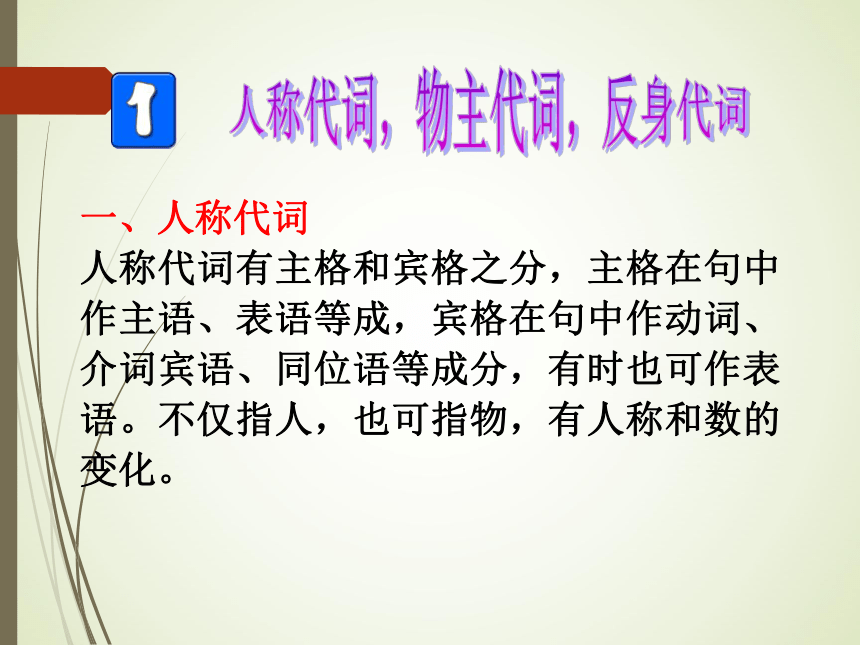
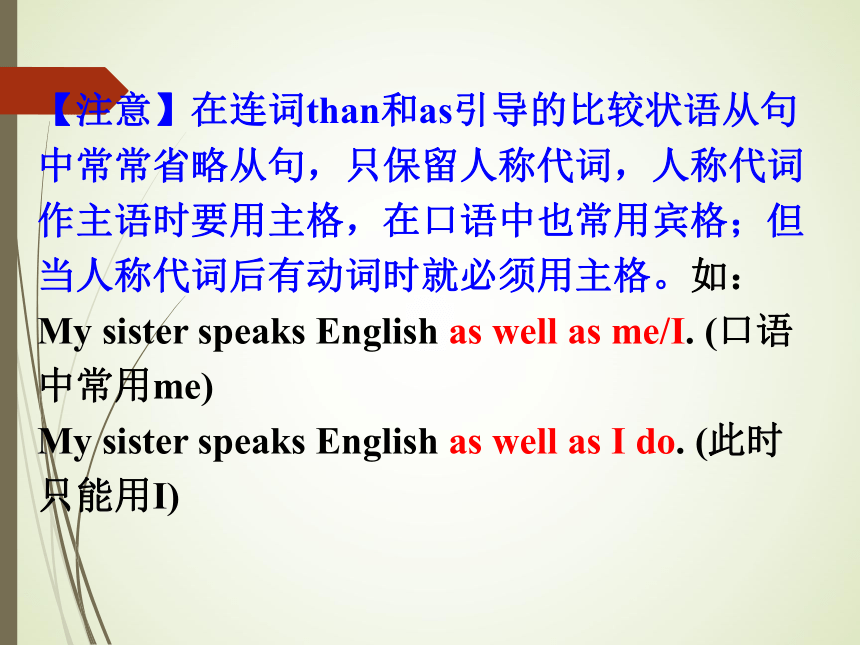
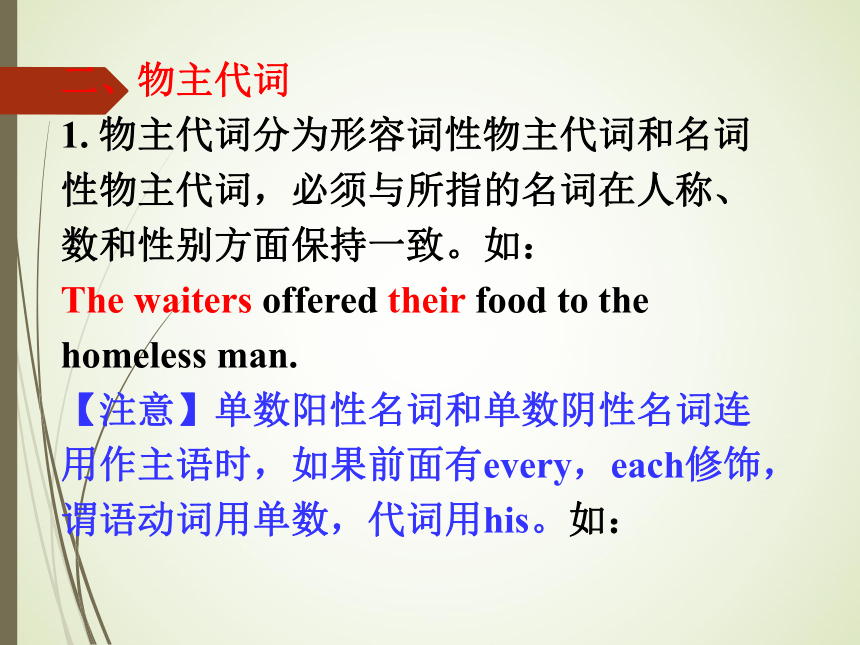
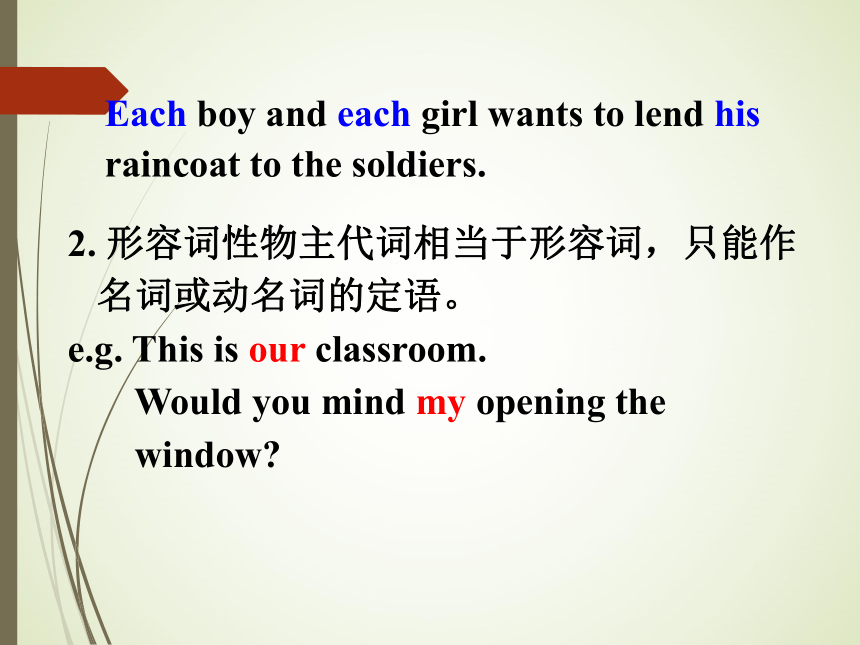
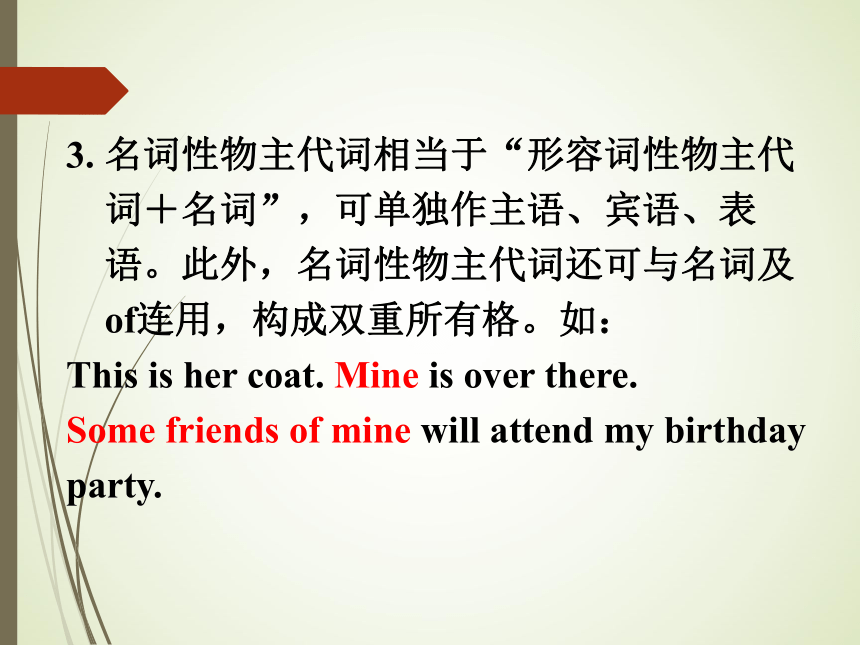
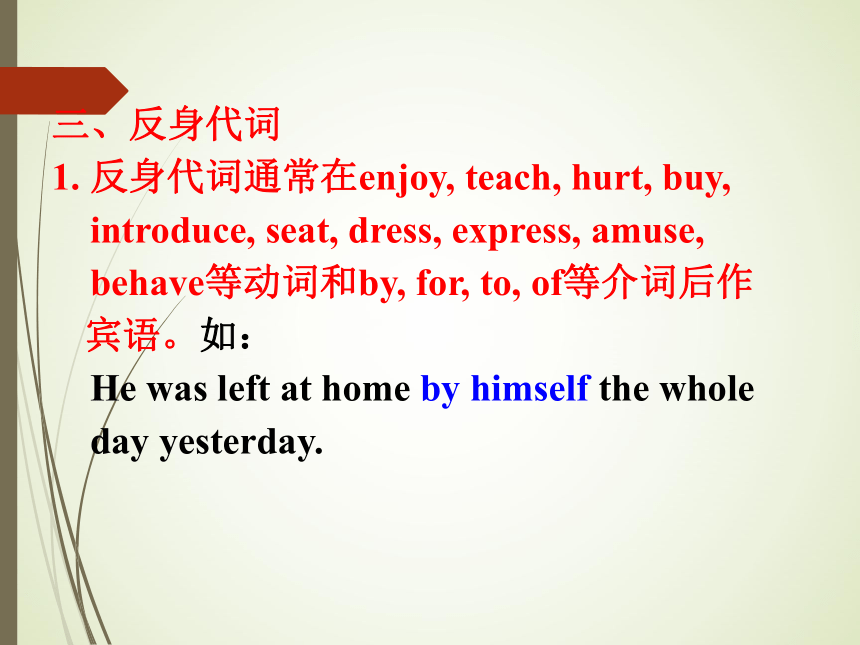
文档简介
课件47张PPT。代词知识点归纳一、代词分类一、人称代词
人称代词有主格和宾格之分,主格在句中作主语、表语等成,宾格在句中作动词、介词宾语、同位语等成分,有时也可作表语。不仅指人,也可指物,有人称和数的变化。人称代词,物主代词,反身代词【注意】在连词than和as引导的比较状语从句中常常省略从句,只保留人称代词,人称代词作主语时要用主格,在口语中也常用宾格;但当人称代词后有动词时就必须用主格。如:
My sister speaks English as well as me/I. (口语中常用me)
My sister speaks English as well as I do. (此时只能用I)二、物主代词
1. 物主代词分为形容词性物主代词和名词
性物主代词,必须与所指的名词在人称、数和性别方面保持一致。如:
The waiters offered their food to the homeless man.
【注意】单数阳性名词和单数阴性名词连用作主语时,如果前面有every,each修饰,谓语动词用单数,代词用his。如:2. 形容词性物主代词相当于形容词,只能作
名词或动名词的定语。
e.g. This is our classroom.
Would you mind my opening the
window?Each boy and each girl wants to lend his raincoat to the soldiers.3. 名词性物主代词相当于“形容词性物主代
词+名词”,可单独作主语、宾语、表
语。此外,名词性物主代词还可与名词及
of连用,构成双重所有格。如:
This is her coat. Mine is over there.
Some friends of mine will attend my birthday party. 三、反身代词
1. 反身代词通常在enjoy, teach, hurt, buy,
introduce, seat, dress, express, amuse,
behave等动词和by, for, to, of等介词后作宾语。如:
He was left at home by himself the whole
day yesterday. 2. 反身代词可以作主语的同位语,主要起加
强语气的作用,意为“亲自,本人,亲
身”。
e.g. The teacher and pupils mended the
road themselves.
3. 反身代词可以在be, feel, look, seem等系动
词后作表语,表示身体或精神状态处于正
常。
e.g. —You look pale. What’s wrong with you?
—I’m not feeling myself today, not
serious, though. 注意
(1) 反身代词本身不能单独作主语。
(正) I myself drove the car. 我自己开车。
(误) Myself drove the car.
(2) 在由and, or, nor连接的并列主语中,第
二个主语可用反身代词,特别是myself
作主语。
e.g. Charles and myself saw it.
(3) 在不强调的情况下,but, except, for等介
词后宾语用反身代词或人称代词均可。
e.g. No one but myself/me is hurt.4. 反身代词的习惯搭配
介词+反身代词
for oneself 为自己;亲自地
to oneself 对自己;独用
of oneself 自动地
by oneself 独自地(2) 动词+反身代词
dress oneself 自己穿衣
make oneself at home 不要客气
seat oneself=be seated 就坐
teach oneself 自学
come to oneself 苏醒
devote oneself to = be devoted to 致力于
enjoy oneself 过得愉快,玩得高兴
help oneself to 自行取用,请自便accustom oneself to=be accustomed to 习惯于
amuse oneself 消遣,自娱
behave oneself 表现良好
apply oneself to sth. 致力于
explain oneself 说明自己的意图
express oneself 表达自己的思想
abandon oneself to 沉迷于,放纵一、指示代词
指示代词是用来指代或标记人或事物的代词,表示“这个(些)”、“那个(些)”。
1. 指上文提到的事物,一般用that,有时也用this;指下文将要提到的事物,常用this或these。如:
He said I was lying, and that was unfair.
(that指代上文He said I was lying)
What I want you to remember is this:
Practise makes perfect.
(此句中this指代下文,不能换为that)指示代词,相互代词,疑问代词和不定代词2. that/those可作定语从句的先行词,但
this/these不能;其中those可指人,但that
不能。如:
She has known that which she wanted to
know.
I admire those who are always helping
others.
(those作定语从句的先行词,指人)二、相互代词
相互代词是表示相互关系的代词,只有each other和one another两个词组,都表示“互相,相互”。
1. each other和one another在句中可以作动词
或介词的宾语。如:
Let’s help each other and learn from each
other.
They looked at one another and laughed.
2. 作定语时each other和one another须用
所有格,表示“彼此的”。如:
We said hello to one another’s/each
other’s family.三、疑问代词
疑问代词是用来进行提问,构成特殊疑问句的词,包括who, whom, whose, what, which等。
1. 疑问代词后接-ever的用法。
(1) whatever/whoever/whomever/whichever
表泛指,意为“无论……”。如:
You have our support, whatever you
decide.
Whichever of you gets here first will get
the prize.
I don’t want to see them, whoever they
are.(2) 置于疑问代词后,用于加强语气。如:
Whatever do you mean?
Whoever heard of such a thing!2. 疑问代词的单复数形式要由所代表的人或事
物的单复数形式来确定,如果不清楚代表的
人或物是复数还是单数,则谓语动词多用单
数形式。who/what/which作主语时,谓语动
词既可以用单数形式,也可以用复数形式。
如:
What he needs most is his mother’s love.
What we need are good books.四、不定代词
1)不定代词可分为两类:
a. 由body, one, thing构成的复合不定代词b. some, any, both, none, either, neither, all,
one, each, many, much, another, other,
more, most, few, little等。
2)不定代词在句中可用作主语、宾语、表
语、同位语、定语或状语。如:
One should be careful when crossing the street.
Tess went and said goodbye to all her favourite
cows, touching each of them with her hand.
He was little or nothing of a translator.
In that case, we’ll each pay half.
There’s still some wine in the bottle.
It was nothing like what I had imagined.3)复合不定代词构成的固定短语:
anything but根本不,一点也不
nothing but只不过
do nothing but
只有,除……之外什么事也不做
have something/nothing to do with
与……有/无关
something of有点,有几分易混淆点辨析一、全部否定与部分否定
由some和any构成的不定代词的用法与some和any的用法基本一致。all, both, everyone, everybody, everything以及“every+名词”都表示全部肯定;no one, none, nobody, nothing, not...any以及“no+名词”都表示全部否定;但当not出现在含有全部肯定的不定代词的句子中,不管not在它们之前还是在它们之后都表示部分否定。此外not与总括性副词如everywhere, always, wholly, altogether等连用时也表示部分否定。
e.g. All of the boys are clever, but none of
them can work out this problem. (all表示
全部肯定,none表示全部否定)
Such a thing can’t be found everywhere.
(“not+everywhere”表示部分否定) The exam is very easy, but not all of the
students can pass it.
(“not+all”表示部分否定)二、both, either, neither, each, all, none
both表示两者都,具有肯定含义;either表示两者中的任何一个;neither表示两者都不;each表示两者或两者以上的每一个;all表示全部,指三者或三者以上的人或物,也可笼统地表示“一切,所有”;none表示三者或三者以上的人或物的全部否定,与of连用或用来回答how many / much的提问。【考例】It’s an either-or situation — we can buy a new car this year or we can go on holiday but we can’t do _____.?
A. others ? ? ? ? ? ? ? ? ? ? ? ? B. either
C. another???? ?????????????????D. bothD三、another, other, the other, others, the
others
another泛指三者或三者以上的人或物中不确定的另一个;other表示“另外的人/物,别的人/物”;the other指两者中的另一个;others = other +名词,泛指“别的人或物”;the others指“一定范围内其余的人或物”,如果被指代的名词是不可数名词,则用the rest。【考例】In some countries, people eat with chopsticks, while in _____, knives and forks.?
A. another ? ? ? ? ? ? ? ? ? B. others
C. both??? ???????????????????? D. all B四、much, many, (a) few, (a) little往届高考题1. On my recent visit, I held a lively three-month-old twin that had been rejected by 68. ___ (it) mother.
2. If we go on a trip abroad, we can broaden _____ view and gain knowledge we cannot get from books.
itsour3. I thought I knew everything and could
make decisions by ________ (I).
4. In many ways, the education system in the
US is not very different from _____ in
the UK.
5. Every time he arrived home at the end of
the day, we’d greet _____ at the door.
myselfthathim6. How would you like _____ if you were watching your favorite TV program and someone came into the room and just shut it off without asking you?
7. The quality of education in this small school is better than ______ in some larger schools. ititthat8. To warm himself, the sailor sat in front of the fire rubbing one bare foot against ___________.
9. The meeting will be held in September, but _________ knows the date for sure.
the othernobody10. Niki is always full of ideas, but _____ is useful to my knowledge.
11. If it’s a false alarm and there is no fire,
your teacher will lead us back to the
classroom.?( 短文改错)
12. The fruits are small in size ... There are so much that we often share them with our neighbors. (短文改错)youmanynone复习训练选用方框内合适的代词填空(每个代词限用一次)。another, anybody, either, it, myself, neither, nothing, that, those,?others, whichever1. We got the car for ________ because the woman wanted to get rid of it fast.
2. They both smiled; ________ seemed likely to be aware of my absence for long.nothing neither another, anybody, either, it, myself, neither, nothing, that, those,?others, whichever3. If ________ knocks at the door, tell them I’m out.
4. There were glasses of champagne and cigars, but not many of ________ were consumed.
5. ___________ of the cars you choose, I’m sure you’ll be very pleased.anybody either Whichever another, anybody, either, it, myself, neither, nothing, that, those,?others, whichever6. The cells of the body, especially ________ of the brain, can live only several minutes without circulating blood.
7. One of the most important inventions in the history of the world was the printing press. ________ was the electric light. ________ were the telephone, television, and the computer.those? Another ? Othersanother, anybody, either, it, myself, neither, nothing, that, those,?others, whichever8. I had always wanted to meet Mr. Anderson. When I saw him at a party last night, I walked over and introduced ________ to him.
9. The cost of renting an apartment downtown is higher than ________ in any other area of the city.myself that? another, anybody, either, it, myself, neither, nothing, that, those,?others, whichever10. Like most European countries,?France imports more food than ________ exports.?it? 谢谢!
人称代词有主格和宾格之分,主格在句中作主语、表语等成,宾格在句中作动词、介词宾语、同位语等成分,有时也可作表语。不仅指人,也可指物,有人称和数的变化。人称代词,物主代词,反身代词【注意】在连词than和as引导的比较状语从句中常常省略从句,只保留人称代词,人称代词作主语时要用主格,在口语中也常用宾格;但当人称代词后有动词时就必须用主格。如:
My sister speaks English as well as me/I. (口语中常用me)
My sister speaks English as well as I do. (此时只能用I)二、物主代词
1. 物主代词分为形容词性物主代词和名词
性物主代词,必须与所指的名词在人称、数和性别方面保持一致。如:
The waiters offered their food to the homeless man.
【注意】单数阳性名词和单数阴性名词连用作主语时,如果前面有every,each修饰,谓语动词用单数,代词用his。如:2. 形容词性物主代词相当于形容词,只能作
名词或动名词的定语。
e.g. This is our classroom.
Would you mind my opening the
window?Each boy and each girl wants to lend his raincoat to the soldiers.3. 名词性物主代词相当于“形容词性物主代
词+名词”,可单独作主语、宾语、表
语。此外,名词性物主代词还可与名词及
of连用,构成双重所有格。如:
This is her coat. Mine is over there.
Some friends of mine will attend my birthday party. 三、反身代词
1. 反身代词通常在enjoy, teach, hurt, buy,
introduce, seat, dress, express, amuse,
behave等动词和by, for, to, of等介词后作宾语。如:
He was left at home by himself the whole
day yesterday. 2. 反身代词可以作主语的同位语,主要起加
强语气的作用,意为“亲自,本人,亲
身”。
e.g. The teacher and pupils mended the
road themselves.
3. 反身代词可以在be, feel, look, seem等系动
词后作表语,表示身体或精神状态处于正
常。
e.g. —You look pale. What’s wrong with you?
—I’m not feeling myself today, not
serious, though. 注意
(1) 反身代词本身不能单独作主语。
(正) I myself drove the car. 我自己开车。
(误) Myself drove the car.
(2) 在由and, or, nor连接的并列主语中,第
二个主语可用反身代词,特别是myself
作主语。
e.g. Charles and myself saw it.
(3) 在不强调的情况下,but, except, for等介
词后宾语用反身代词或人称代词均可。
e.g. No one but myself/me is hurt.4. 反身代词的习惯搭配
介词+反身代词
for oneself 为自己;亲自地
to oneself 对自己;独用
of oneself 自动地
by oneself 独自地(2) 动词+反身代词
dress oneself 自己穿衣
make oneself at home 不要客气
seat oneself=be seated 就坐
teach oneself 自学
come to oneself 苏醒
devote oneself to = be devoted to 致力于
enjoy oneself 过得愉快,玩得高兴
help oneself to 自行取用,请自便accustom oneself to=be accustomed to 习惯于
amuse oneself 消遣,自娱
behave oneself 表现良好
apply oneself to sth. 致力于
explain oneself 说明自己的意图
express oneself 表达自己的思想
abandon oneself to 沉迷于,放纵一、指示代词
指示代词是用来指代或标记人或事物的代词,表示“这个(些)”、“那个(些)”。
1. 指上文提到的事物,一般用that,有时也用this;指下文将要提到的事物,常用this或these。如:
He said I was lying, and that was unfair.
(that指代上文He said I was lying)
What I want you to remember is this:
Practise makes perfect.
(此句中this指代下文,不能换为that)指示代词,相互代词,疑问代词和不定代词2. that/those可作定语从句的先行词,但
this/these不能;其中those可指人,但that
不能。如:
She has known that which she wanted to
know.
I admire those who are always helping
others.
(those作定语从句的先行词,指人)二、相互代词
相互代词是表示相互关系的代词,只有each other和one another两个词组,都表示“互相,相互”。
1. each other和one another在句中可以作动词
或介词的宾语。如:
Let’s help each other and learn from each
other.
They looked at one another and laughed.
2. 作定语时each other和one another须用
所有格,表示“彼此的”。如:
We said hello to one another’s/each
other’s family.三、疑问代词
疑问代词是用来进行提问,构成特殊疑问句的词,包括who, whom, whose, what, which等。
1. 疑问代词后接-ever的用法。
(1) whatever/whoever/whomever/whichever
表泛指,意为“无论……”。如:
You have our support, whatever you
decide.
Whichever of you gets here first will get
the prize.
I don’t want to see them, whoever they
are.(2) 置于疑问代词后,用于加强语气。如:
Whatever do you mean?
Whoever heard of such a thing!2. 疑问代词的单复数形式要由所代表的人或事
物的单复数形式来确定,如果不清楚代表的
人或物是复数还是单数,则谓语动词多用单
数形式。who/what/which作主语时,谓语动
词既可以用单数形式,也可以用复数形式。
如:
What he needs most is his mother’s love.
What we need are good books.四、不定代词
1)不定代词可分为两类:
a. 由body, one, thing构成的复合不定代词b. some, any, both, none, either, neither, all,
one, each, many, much, another, other,
more, most, few, little等。
2)不定代词在句中可用作主语、宾语、表
语、同位语、定语或状语。如:
One should be careful when crossing the street.
Tess went and said goodbye to all her favourite
cows, touching each of them with her hand.
He was little or nothing of a translator.
In that case, we’ll each pay half.
There’s still some wine in the bottle.
It was nothing like what I had imagined.3)复合不定代词构成的固定短语:
anything but根本不,一点也不
nothing but只不过
do nothing but
只有,除……之外什么事也不做
have something/nothing to do with
与……有/无关
something of有点,有几分易混淆点辨析一、全部否定与部分否定
由some和any构成的不定代词的用法与some和any的用法基本一致。all, both, everyone, everybody, everything以及“every+名词”都表示全部肯定;no one, none, nobody, nothing, not...any以及“no+名词”都表示全部否定;但当not出现在含有全部肯定的不定代词的句子中,不管not在它们之前还是在它们之后都表示部分否定。此外not与总括性副词如everywhere, always, wholly, altogether等连用时也表示部分否定。
e.g. All of the boys are clever, but none of
them can work out this problem. (all表示
全部肯定,none表示全部否定)
Such a thing can’t be found everywhere.
(“not+everywhere”表示部分否定) The exam is very easy, but not all of the
students can pass it.
(“not+all”表示部分否定)二、both, either, neither, each, all, none
both表示两者都,具有肯定含义;either表示两者中的任何一个;neither表示两者都不;each表示两者或两者以上的每一个;all表示全部,指三者或三者以上的人或物,也可笼统地表示“一切,所有”;none表示三者或三者以上的人或物的全部否定,与of连用或用来回答how many / much的提问。【考例】It’s an either-or situation — we can buy a new car this year or we can go on holiday but we can’t do _____.?
A. others ? ? ? ? ? ? ? ? ? ? ? ? B. either
C. another???? ?????????????????D. bothD三、another, other, the other, others, the
others
another泛指三者或三者以上的人或物中不确定的另一个;other表示“另外的人/物,别的人/物”;the other指两者中的另一个;others = other +名词,泛指“别的人或物”;the others指“一定范围内其余的人或物”,如果被指代的名词是不可数名词,则用the rest。【考例】In some countries, people eat with chopsticks, while in _____, knives and forks.?
A. another ? ? ? ? ? ? ? ? ? B. others
C. both??? ???????????????????? D. all B四、much, many, (a) few, (a) little往届高考题1. On my recent visit, I held a lively three-month-old twin that had been rejected by 68. ___ (it) mother.
2. If we go on a trip abroad, we can broaden _____ view and gain knowledge we cannot get from books.
itsour3. I thought I knew everything and could
make decisions by ________ (I).
4. In many ways, the education system in the
US is not very different from _____ in
the UK.
5. Every time he arrived home at the end of
the day, we’d greet _____ at the door.
myselfthathim6. How would you like _____ if you were watching your favorite TV program and someone came into the room and just shut it off without asking you?
7. The quality of education in this small school is better than ______ in some larger schools. ititthat8. To warm himself, the sailor sat in front of the fire rubbing one bare foot against ___________.
9. The meeting will be held in September, but _________ knows the date for sure.
the othernobody10. Niki is always full of ideas, but _____ is useful to my knowledge.
11. If it’s a false alarm and there is no fire,
your teacher will lead us back to the
classroom.?( 短文改错)
12. The fruits are small in size ... There are so much that we often share them with our neighbors. (短文改错)youmanynone复习训练选用方框内合适的代词填空(每个代词限用一次)。another, anybody, either, it, myself, neither, nothing, that, those,?others, whichever1. We got the car for ________ because the woman wanted to get rid of it fast.
2. They both smiled; ________ seemed likely to be aware of my absence for long.nothing neither another, anybody, either, it, myself, neither, nothing, that, those,?others, whichever3. If ________ knocks at the door, tell them I’m out.
4. There were glasses of champagne and cigars, but not many of ________ were consumed.
5. ___________ of the cars you choose, I’m sure you’ll be very pleased.anybody either Whichever another, anybody, either, it, myself, neither, nothing, that, those,?others, whichever6. The cells of the body, especially ________ of the brain, can live only several minutes without circulating blood.
7. One of the most important inventions in the history of the world was the printing press. ________ was the electric light. ________ were the telephone, television, and the computer.those? Another ? Othersanother, anybody, either, it, myself, neither, nothing, that, those,?others, whichever8. I had always wanted to meet Mr. Anderson. When I saw him at a party last night, I walked over and introduced ________ to him.
9. The cost of renting an apartment downtown is higher than ________ in any other area of the city.myself that? another, anybody, either, it, myself, neither, nothing, that, those,?others, whichever10. Like most European countries,?France imports more food than ________ exports.?it? 谢谢!
